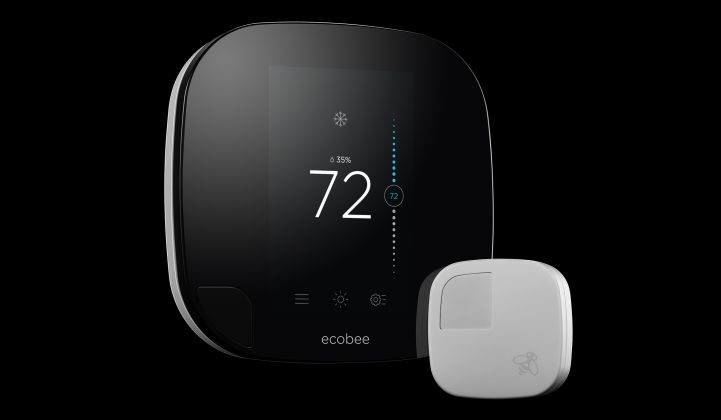Amazon Alexa Fund made its largest investment to date in smart thermostat company ecobee. Ecobee raised a total of $35 million in its Series B round, which also included Thomvest Ventures and existing investor Relay Ventures.
The web giant and Canadian startup already had a budding relationship, as ecobee was the first smart thermostat to be directly compatible with Amazon Echo, the speaker that connects to Amazon’s Alexa voice service.
By integrating with Alexa, ecobee customers can control their thermostat with their voice -- telling Alexa to turn the temperature up or down. Nest and Sensi also work with Alexa.
“We’re excited to see what the future holds for this growing company and the new voice experiences they’ll bring to Amazon Alexa customers,” Steve Rabuchin, VP of Amazon Alexa, said in a statement.
The Alexa Fund offers up to $100 million in investments to companies that are pushing the envelope on voice technology, from creating new Alexa capabilities to building devices that offer novel experiences through Alexa. More than 15 companies have received money from Alexa Fund, including the makers of the Mara running assistant, the Ring video doorbell service, and the intelligent sprinkler controller Rachio.
In the crowded field of smart, connected thermostats, which includes sleek, popular brands such as Nest and ecobee, everyone is still trying to figure out just exactly what that ideal customer experience will be. Now that there are so many products, that differentiation is happening.
Ecobee 3 stands out with its additional sensors that can help the thermostat better adjust to temperature differences between various rooms. Others, like Nest, cater to those that never want to touch their thermostat, while Alarm.com’s thermostat offers a tight integration with the rest of Alarm.com devices in the home. Many options on the market offer geo-fencing capabilities, as well.
The issue of tight integration continues to be a sticking point, however. Last year, Alarm.com decided to build its own piece of hardware because it wanted a sleek thermostat that used Z-Wave for communication, something it wasn’t finding on the market. Apple HomeKit has been touted for over a year, and while most major thermostat brands are integrated with it, it hasn’t necessarily animated the smart home market yet.
Of course, "smart home" means different things to different people. And it is still more about individual outcomes (better security, or more control over temperature, for example) than it is about a holistic experience where devices are connected across the home.
That has made it difficult for any company to find the right approach. Earlier this year, Nest co-founder Tony Fadell left the company, as he said it had entered “maintenance mode.” It continues to build out an ecosystem of devices through its “Works With Nest” program, but is unclear how many consumers are actually clamoring for that ecosystem.
For now, security concerns are still top priority when it comes to a connected home, with a smart thermostat second, and other items, such as smart irrigation or intelligent LEDs, a distant third. In an effort to try to understand which devices customers want, last year Lowe’s rolled out the latest version of its Iris platform, and it now sells its hub and accompanying devices separately so consumers can pick and choose from the myriad of connected devices that sit on Lowe’s store shelves.
Amazon's virtual shelves are also filled with smart devices. Yet it is unclear whether it cares about being the central hub for the smart home as others, such as Nest, seem to want to achieve. Instead, integrating products with Alexa seems to be happening through middleman hubs such as Wink, Samsung SmartThings and smart plug WeMo.
For ecobee, the funding should allow it to get a leg up on voice integration to continue to differentiate itself as a product tightly integrated with Alexa, which could help continue to drive sales. Amazon has already sold millions of Echos, according to reports, and yet only one-fifth of those are being used to control devices, leaving a lot of headroom for sales of devices that tout a seamless experience with the service.
The funding is by far ecobee’s largest round to date, bringing its total to more than $50 million with previous investors including InvestEco Capital, Carrier Corporation, Just Energy, Ontario Capital Growth and Tech Capital Partners.



